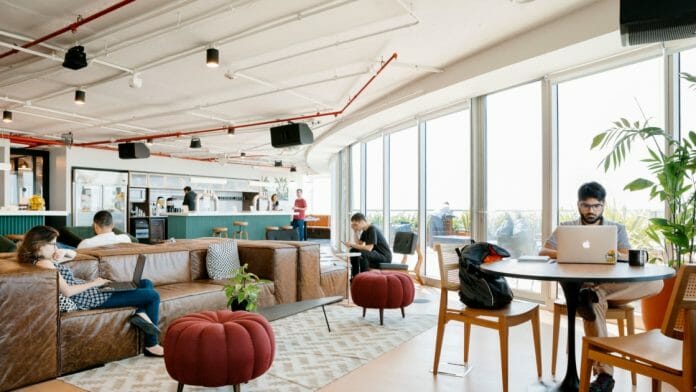Business Today Malaysia speaks to Ray Tan, Head of Growth for SEA on the changing co-working landscape in Malaysia amid the ongoing Covid-19 outbreak.
By Poovenraj Kanagaraj
The Covid-19 outbreak that had consumed the world since December had impacted economies and industries globally. As nations went under lockdown, businesses had no choice but to adapt to the changing circumstances and along with the change, came new work practices.
In Malaysia, the Movement Control Order (MCO) was implemented on March 18 saw companies scrambling to decide on their next move which then led to an increase in the work-from-home practice.
While the work-from-home trend had penetrated the Malaysian working ecosystem for years, it was however – for a time – seen as a practice only among young startups unable to afford rent space. Prior to this, co-working spaces had been the more popular choice for both international and local companies as well as freelancers.
Flexible working spaces are said to occupy about 4 percent of total Asia Pacific office stock and accounts for a slightly lower figure in the Grade A segment.
However, due to the Covid-19 outbreak, a CBRE Research report late-May pointed out that office demand in Asia Pacific weakened significantly owing to the double impact of the fading economic growth prior to the onset of the virus outbreak. As demand in Greater China and Singapore was the first to be affected, other markets had also started showing signs of slowdown in leasing activity as social distancing measures came into force.
“Some of the short-term downside risks to office demand will include more headcount reduction, along with faster consolidation in the flexible space industry,” CBRE stated.
“Much of what used to be the norm will no longer be the case. For instance, we can all agree the way people travel will look different and in the same vein, so will the way people work,” says Ray Tan, Head Growth for WeWork Southeast Asia.
While the rising sentiment in the business community seems to favour working from home, WeWork on the other hand expressed optimism on the future of its direction amid the crisis.
Over the last year, WeWork witnessed more enterprises turn to them for workspace solutions with its Malaysian market providing the highest increase in enterprise members in Southeast Asia. WeWork Malaysia saw a 37 percent increase in enterprise members this year compared to 2019.
StashAway, a wealth management company who had been a member with WeWork in Malaysia, recently expanded its presence in the country and plans to further leverage the co-working space’s workplace solutions and enter Thailand this year. In Singapore, the space-as-a-service provider signed one of their largest enterprise accounts.
Tan tells Business Today Malaysia that the last few months have also highlighted new work models. While companies have adopted the work-from-home practice as a temporary measure during the MCO, he pointed out that the flexible space service provider have also seen challenges and limits arising from the practice such as the impact on productivity and collaboration. This further includes space and tools limitations faced by many employees.
The new work model according to WeWork will see companies exploring workspace flexibility and solutions that will support distancing and segregated workforce. “Our hub-and-spoke model sees companies setting up their headquarters in one building and have supporting functions in other WeWork locations,” Tan tells Business Today.
“The economic impact of Covid-19 will also see companies take on a more conservative approach when it comes to operations and we are seeing companies opt for workplace solutions like WeWork as opposed to traditional leases to better manage overheads and operational costs.”
During the MCO, WeWork observed more emphasis on business continuity spaces by enterprises in order to segregate the workforce. As companies scale back to operation after MCO, they are expected to emphasise on distancing and flexibility of space to ensure the safety of their employees.
“This brings back the opportunity for us to continuously engage enterprises in the country on the value of space-as-a-service, not only as a business strategy but also a way to help navigate the new work normal post-MCO,” says Tan.
Tan also believes that as the Covid-19 outbreak has undoubtedly impacted all industries and sectors, the situation which is expected to last for a while, has forced businesses to think longer term and be proactive with their strategies. Many companies as he say are left with no option but to reduce overhead and learn to utilise resources more efficiently, especially by having lesser commitment on real estate and outsourcing business functions to cost efficiency.
In terms of its own efforts against the outbreak in Malaysia, Tan says the company had suspended internal and member events as a precautionary measure. “We also gradually implemented staggered work arrangement for our employees and transition to remote support in accordance with the MCO,” he added.
While the WeWork team in Malaysia had also practiced remote working, Tan says the model is not sustainable as the economy rebuilds itself. In a more positive view, he believes that as remote working is provided as an option for more companies, this in return will see the empowerment of space and the support of professional distancing that will shape it.
In a response towards government efforts, WeWork believes that policies and initiatives that will help to drive new and sustainable growth opportunities for businesses will go a long way.
“There have been a rapid increase in the consumption of digital products and services driven by the pandemic and the need for social distancing,” Tan says.
Building on this is momentum, Tan says the Malaysian government can further strengthen and drive more digital transformation-related policies, which will have positive long-term effects on the economy.
Moving forward, Tan says Southeast Asia’s co-working industry has long shown significant growth potential with demand expected to rise over the next few years.
“We believe this trend will only continue as co-working spaces becomes a key recovery asset for companies facing economic challenges. We are also confident to continue leading the conversation around the future of the workplace by offering the right support and solutions for companies of all sizes,” Tan concluded.









